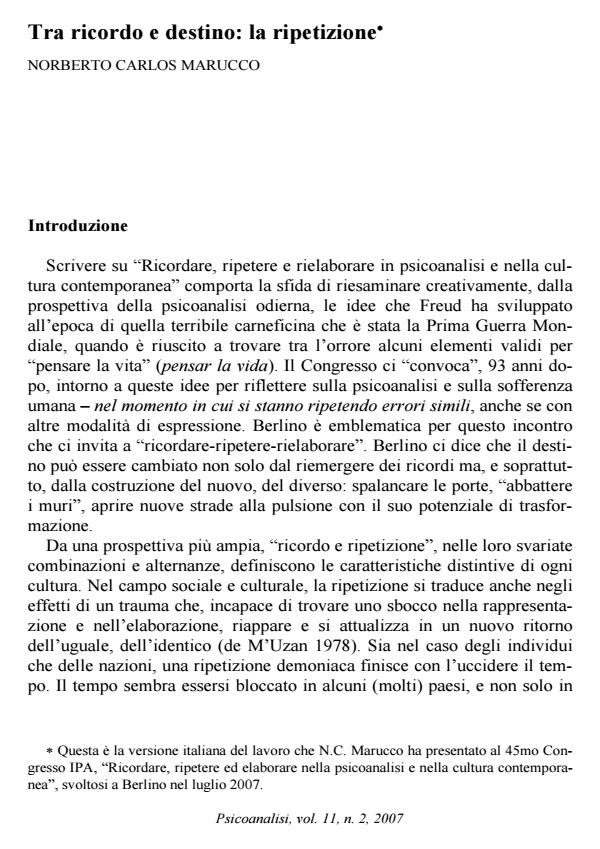Tra ricordo e destino: la ripetizione
Journal title PSICOANALISI
Author/s Norberto Carlos Marucco
Publishing Year 2008 Issue 2007/2
Language Italian Pages 23 P. 5-27 File size 237 KB
DOI
DOI is like a bar code for intellectual property: to have more infomation
click here
Below, you can see the article first page
If you want to buy this article in PDF format, you can do it, following the instructions to buy download credits

FrancoAngeli is member of Publishers International Linking Association, Inc (PILA), a not-for-profit association which run the CrossRef service enabling links to and from online scholarly content.
This essay focuses mainly on the topic of repetition (agieren) on its metapsychological, clinical and technical conceptions. It contains a core problem, that is the question of the represented, the nonrepresented and the unrepresentable in the psyche. This problem, in turn, brings to light the dialectical relation between drive and object and its specific articulation with the traumatic. The author attributes special significance to its clinical expression as destiny. He points out a shift in the theory of the cure from recollection and the unveiling of unconscious desires, to the possibility of understanding pure repetition, which would constitute the very essence of the drive. The author highlights three types of repetition, namely: representative (oedipal) repetition, the repetition of the nonrepresented (narcissistic), which may gain representation, and that of the unrepresentable (sensory impressions, lived experiences from primal times, prelinguistic signifiers, ungovernable mnemic traces). The concept-metaphor of drive embryo brings the author close to the question of the archaic in psychoanalysis, where the repetition in the act would express itself. Another unconscious would zealously conceal the entombed (verschüttet) that we are not yet able to describe the innermost rather than the buried (untergegangen) or the annihilated ((zugrunde gegangen) through a mechanism whose way of expression is repetition in the act. With Constructions in analysis as its starting point, this pare suggests a different technical implementation from that of the Freudian construction: its main material is what emerges in the present of the transference as the repetition of something lacking as history. The memory of the analytic process offers a historical diachrony whereby a temporality freed from repetition and utterly unique might unfold in the analysis. This diachrony would no longer be the historical reconstruction of the material truth, but the construction of something new.
Norberto Carlos Marucco, Tra ricordo e destino: la ripetizione in "PSICOANALISI" 2/2007, pp 5-27, DOI: